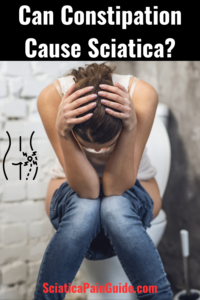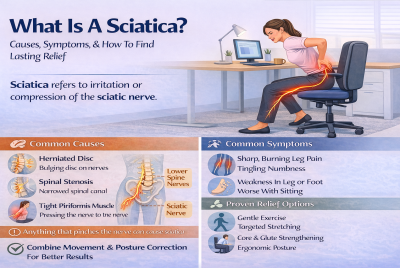Can Constipation Cause Sciatica
Discover if constipation triggers sciatica. Learn prevention tips and relief methods. Dive deeper into can constipation cause sciatica today! Constipation is a common ailment that many people experience at some point in their lives. It occurs when bowel movements become less frequent or difficult to pass. On the other hand, sciatica refers to pain that radiates along the path of the sciatic nerve, which runs from the lower back through the hips and down each leg. But can constipation cause sciatica? Let’s explore the connection between these two conditions and how they may be related.
Understanding Sciatica
To understand the link between constipation and sciatica, it’s essential first to grasp what sciatica is. The sciatic nerve is the longest nerve in the body, originating from the lower spine and running through the buttocks and down the back of each leg. When this nerve is compressed or irritated, it can lead to a range of symptoms collectively known as sciatica. These symptoms may include pain, numbness, tingling, and weakness in the lower back, buttocks, and legs.
What is Constipation?
Constipation occurs when bowel movements become infrequent or difficult, often resulting in hard and dry stools that are painful to pass. Several factors can contribute to constipation, including inadequate fiber intake, dehydration, lack of physical activity, and certain medications. Symptoms of constipation may include straining during bowel movements, abdominal discomfort, bloating, and a sense of incomplete evacuation.
Why Does My Back and Sciatic Nerve Hurt When I’m Constipated?
The Link Between Constipation and Sciatica
The connection between constipation and sciatica lies in the anatomy of the lower body. The bowels and the sciatic nerve are situated close to each other in the pelvis. When constipated, the buildup of fecal matter in the colon can exert pressure on the surrounding structures, including the sciatic nerve. This pressure can irritate the nerve, leading to sciatica symptoms such as pain, numbness, and tingling in the lower back and legs.
Preventing Sciatica Through Good Digestive Health
Maintaining good digestive health is crucial for preventing both constipation and sciatica. One of the best ways to prevent constipation is to ensure an adequate intake of fiber-rich foods such as fruits, vegetables, whole grains, and legumes. Drinking plenty of water and staying physically active can also help regulate bowel movements and prevent constipation. Additionally, avoiding prolonged sitting and maintaining proper posture can reduce the risk of sciatica by relieving pressure on the sciatic nerve.
Exercises to Relieve Sciatica
In addition to promoting good digestive health, specific exercises can help alleviate sciatica symptoms and prevent its recurrence. Stretching exercises that target the muscles of the lower back, hips, and buttocks can help relieve tension and pressure on the sciatic nerve. Core-strengthening exercises are also beneficial for improving stability and reducing the risk of injury. Yoga, in particular, has been shown to be effective in relieving sciatica pain by promoting flexibility and relaxation.
Treatment Options for Constipation and Sciatica
If constipation persists despite dietary and lifestyle modifications, over-the-counter remedies such as fiber supplements, stool softeners, and laxatives may provide relief. In cases of severe or chronic constipation, medical treatments such as prescription medications or bowel training techniques may be necessary. Similarly, treatment for sciatica may include physical therapy, chiropractic care, or nonsteroidal anti-inflammatory drugs (NSAIDs) to alleviate pain and inflammation.
When to Seek Medical Help
While occasional constipation and mild sciatica can often be managed at home with conservative measures, there are instances where medical intervention may be warranted. If constipation is accompanied by severe abdominal pain, vomiting, or blood in the stool, it may indicate a more serious underlying condition that requires prompt medical attention. Similarly, if sciatica symptoms persist despite self-care measures or worsen over time, it’s essential to consult a healthcare professional for proper diagnosis and treatment.
FAQs Related to Can Constipation Cause Sciatica
Can constipation cause permanent damage to the sciatic nerve?
While constipation itself may not cause permanent damage to the sciatic nerve, chronic or severe cases of constipation can lead to prolonged pressure on the nerve, potentially exacerbating symptoms of sciatica.
Is there a specific diet that can help prevent both constipation and sciatica?
A diet rich in fiber, fluids, and nutrients can promote regular bowel movements and support overall spinal health, reducing the risk of both constipation and sciatica.
Are there any specific yoga poses that can help relieve sciatica pain?
Yes, specific yoga poses such as downward-facing dog, pigeon pose, and seated forward fold can help stretch and strengthen the muscles surrounding the sciatic nerve, providing relief from sciatica pain.
Can sitting for long periods worsen symptoms of both constipation and sciatica?
Yes, prolonged sitting can increase pressure on the lower back and pelvis, exacerbating symptoms of constipation and sciatica. Taking regular breaks and practicing good posture are important ways to alleviate pressure on the affected areas.
What are some alternative therapies for managing sciatica pain?
In addition to conventional treatments such as physical therapy and medication, alternative therapies such as acupuncture, massage therapy, and chiropractic care may provide relief from sciatica pain and discomfort.
Extra FAQs Related to Can Constipation Cause Sciatica
What part of your body hurts when you are constipated?
When constipated, abdominal discomfort is common, often manifesting as cramping or bloating. Additionally, constipation can lead to lower back pain due to increased pressure on the pelvic area. This discomfort may radiate to the lower back, contributing to overall discomfort and pain.
Can constipation cause back pain and leg pain?
Yes, constipation can cause back pain and leg pain. Constipation can lead to increased pressure on the lower back and pelvic area, resulting in discomfort that may radiate down the legs. Additionally, prolonged constipation can contribute to muscle tension and inflammation, exacerbating pain symptoms in the back and legs.
Can constipation cause buttock pain?
Yes, constipation can cause buttock pain. When constipated, pressure builds up in the lower abdomen and pelvis, potentially affecting the muscles and nerves in the buttock region. This pressure can lead to discomfort, soreness, or even sharp pain in the buttocks, contributing to overall discomfort and inconvenience.
How can I tell if my pain is sciatica?
You may have sciatica if you experience pain, numbness, or tingling that radiates from your lower back down one leg. This pain may worsen when sitting or standing for long periods and may be accompanied by weakness in the affected leg. Consulting a healthcare professional can confirm the diagnosis.
What relaxes the sciatic nerve?
The sciatic nerve can be relaxed through various methods, including gentle stretching exercises targeting the lower back, hips, and legs. Additionally, yoga, massage therapy, and heat therapy can help alleviate tension and inflammation along the sciatic nerve pathway, promoting relaxation and pain relief.
Can Constipation Cause Sciatica – Conclusion
In conclusion, while constipation and sciatica may seem like unrelated conditions, there is a clear connection between the two. Constipation can exert pressure on the sciatic nerve, leading to sciatica symptoms such as pain, numbness, and tingling in the lower back and legs. By promoting good digestive health through dietary and lifestyle modifications and incorporating regular exercise into your routine, you can reduce the risk of both constipation and sciatica and enjoy better overall well-being.
Disclaimer
Please note that the information provided in this article is for informational purposes only and should not replace professional medical advice. If you’re experiencing sciatica pain or any health concerns, it’s advisable to consult a healthcare professional for proper diagnosis and treatment.






